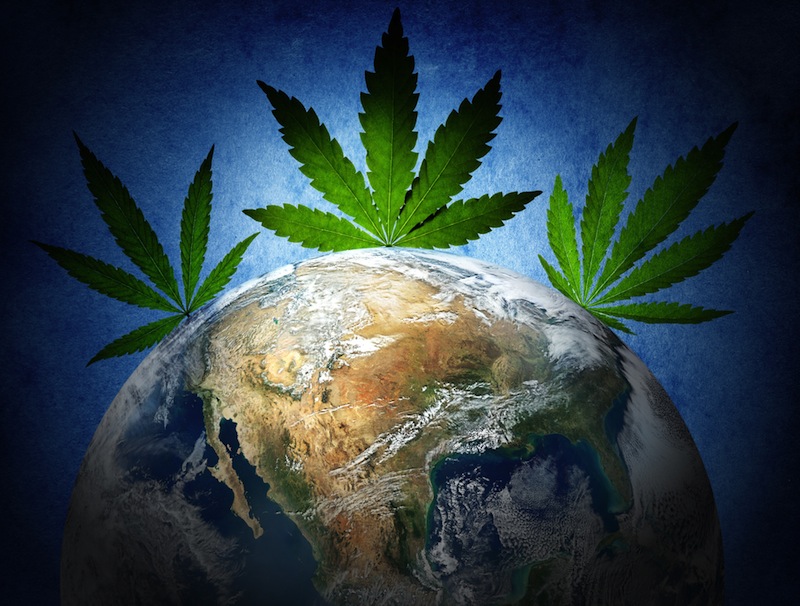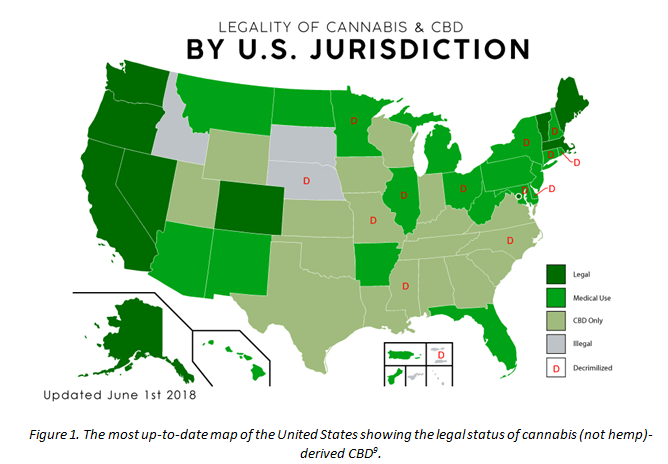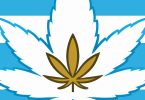It’s June of 2018, and every month the laws regarding CBD legalization laws are changing. It’s hard to keep track of! Today, we are here to bring you the most current and up to date information on the CBD laws from the United States and different parts of world.
To start, there are three types of legalized CBD legislation for CBD derived from cannabis:
- Fully legal; open to the public, usually over a certain age limit to prevent misuse.
- Medical; legal with medical marijuana card prescribed by a licensed physician.
- Highly Regulated: Available only under stringent and specific conditions; usually obtained directly from a hospital or healthcare provider rather than a dispensary; only available for patients suffering from qualifying conditions (1).
Unrefined CBD derived from cannabis typically contains 3 to 15 percent THC on a dry-weight basis (2). CBD derived from hemp, the closely-related relative of the C. sativa plant, contains very little THC. The laws are slightly different depending on the source of the CBD.
CBD Derived from Cannabis
States Where CBD is Fully Legal (Open to Public):
Alaska, California, Colorado, Maine, Massachusetts, Nevada, Oregon, Vermont, Washington, and as of May 2018, Kansas (1,3).
States Where CBD is Medicinal(Drs. Recommendation):
Alaska, Arizona, Arkansas, California, Colorado, Connecticut, Delaware, Florida, Hawaii, Illinois, Maine, Maryland, Massachusetts, Michigan, Minnesota, Montana, Nevada, New Hampshire, New Jersey, New Mexico, New York, North Dakota, Ohio, Oregon, Pennsylvania, RhodeIsland, Vermont, Washington, Washington DC, West Virginia, (1).
*States that appear on both the Fully Legal and Medicinal lists have different supply chains for each legislative category. For example, cannabis that has been designated as Medicinal when planted cannot be used to make Fully Legal products or sold at adult-use dispensaries when it has matured. The same is true vice-versa; the supply chains of each system must remain independent of each other.
States Where CBD is Highly Regulated (Qualifying Conditions Only):
Alabama, Georgia, Indiana, Iowa, Kentucky, Mississippi, Missouri, North Carolina, Oklahoma, South Carolina, Tennessee, Texas, Utah, Virginia, Wisconsin, Wyoming (4).
States Where CBD is Illegal (For Any Reason):
Idaho, Nebraska, South Dakota (1).
Countries Where CBD is Fully Legal (Open to Public):
Colombia, Jamaica (if Rastafarian), Mexico, Spain, the Netherlands, Uruguay (1).
Countries Where CBD is Medicinal (Drs. Recommendation):
Australia, Canada, Chile, Czech Republic, France, Guam, Israel, Macedonia, Puerto Rico, Romania, United Kingdom (1).
CBD Derived from Hemp
On May 22nd, 2018, The DEA released an internal directive stating that hemp-derived CBD oil products are not regulated under the Controlled Substance Act. In effect, the DEA clarified what those in the hemp industry have known for a long time; that it is not the cannabinoids themselves that are illegal, but rather their source. That makes CBD derived from hemp products legal on a federal level (at least as far as the DEA is concerned) (5).
The pending 115th Congress bill, the Hemp Farming Act of 2018, and the Agricultural Act of 2014 define hemp as:“the plant Cannabis sativa L. and any part of that plant, including the seeds thereof and all derivatives, extracts, cannabinoids, isomers, acids, salts, and salts of isomers, whether growing or not, with a delta-9 tetrahydrocannabinol concentration of not more than 0.3 percent on a dry weight basis” (6,7). The Hemp Farming Act of 2018 would amend the Agricultural Marketing Act of 1946 to provide for State and Tribal regulation of hemp production, and for other purpose.
With the pace in which states have been legalizing CBD for both medicinal or adult-use reasons continuing to accelerate, it’s only a matter of time before cannabis-derived CBD is legal nationwide.
References:
- https://isum.com/cbd-legal-status/
- https://www.medicalmarijuana.com.au/science/news/cannabis-science/industrial-hemp-cbd-vs-medical-cannabis-cbd
- http://kslegislature.org/li/b2017_18/measures/documents/supp_note_sb282_02_0000.pdf
- https://medicalmarijuana.procon.org/view.resource.php?resourceID=000881
- https://www.deadiversion.usdoj.gov/schedules/marijuana/dea_internal_directive_cannabinoids_05222018.html
- https://www.congress.gov/bill/115th-congress/senate-bill/2667/text
- https://www.congress.gov/bill/113th-congress/house-bill/2642/text
- https://medicalmarijuana.procon.org/view.resource.php?resourceID=000881











